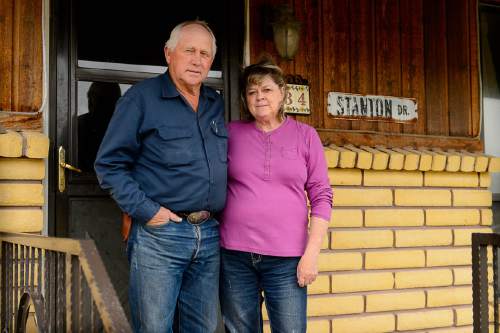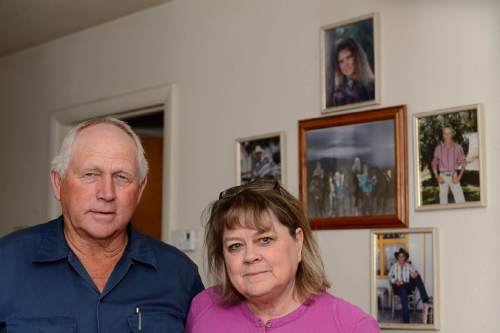This is an archived article that was published on sltrib.com in 2016, and information in the article may be outdated. It is provided only for personal research purposes and may not be reprinted.
Kingston • Stanton Gleave helped retake Cliven Bundy's cattle from the Bureau of Land Management in Bunkerville, Nev., and he was a guest in the Cane Beds, Ariz., house of Robert LaVoy Finicum.
At a January "property rights" workshop in Cedar City — while Bundy's sons Ammon and Ryan joined Finicum in occupying an eastern Oregon wildlife refuge — Gleave posed for a photo with a notice in his left hand that he would "withdraw consent" to be governed by the BLM.
But the lifelong central Utah rancher never sent it in.
Nor, he said, did the six ranchers to his right in the photo, each holding a notice of his own.
Gleave said they were talked into compliance by Tony Rampton, chief of the state attorney general's Public Lands Section, at a February grazing-rights conference in Richfield.
Since that photo was taken, Finicum was shot dead after veering into a snowbank at a police roadblock, and more than three dozen others were indicted for their roles in armed standoffs in Nevada and Oregon.
Many of the central figures have strong ties to Utah. That includes Finicum, whose funeral was held in Kanab, and Cliven Bundy, who prayed at an LDS temple in St. George before deciding to fly to Portland, where he was arrested.
And yet Utah — harder hit by grazing cuts than any other state, according to Farm Bureau CEO Randy Parker — has avoided a similar conflict, in part by mediating disputes and begging patience from some of its more aggrieved ranchers.
Ranchers such as Gleave.
"They said if we give them a while, everything will change," Gleave said. "... If the state does what they say they'll do, that's a big step."
—
Gleave explained himself patiently and with folksy humor.
He knows, he said, that when he mentions the Constitution, it will cause many outside his own rural network to dismiss him as "a radical nut."
It is nonetheless his starting point that the federal government has no constitutional right to the land where he and his four sons graze about 1,000 cattle and 3,000 sheep.
He rapped a dining room table as he spoke, his hand forming a right angle in front of him.
If X (the Constitution doesn't allow it), then Y (it's the state's land), and so on down the line.
Gleave said his great-grandfather, a Scotsman, homesteaded the land directly east of his modest house, which is a stone's throw from the sign that reads "Welcome to Kingston."
The 66-year-old learned about ranching from his dad, Jack, who learned it from his dad, Robert, who learned it from his dad, Walter.
Now, he wants his 10 grandchildren to be able to continue in that tradition — if they so choose.
But "every kid that's raised here has to leave," he said, gesturing to where he said nearby gas stations and a pool hall have shuttered in the wake of U.S. Forest Service cuts to timber and grazing allotments.
In 2013, Richfield District Ranger Jason Kling recommended a 50 percent cut in allowed grazing on a Monroe Mountain allotment shared by Gleave with his son Waylon and Piute County rancher Keith Anderton. Kling said foremost among his concerns was cattle grazing outside the permitted season.
Tensions led Forest Service regional Director Terry Padilla to meet with Piute County Commissioner Darin Bushman to discuss the ranchers' appeal.
Gleave said it's "behind us." Kling is more reserved. No final decision has been made, he said, but he allowed that the situation on Monroe Mountain has improved.
And still, minutes from a January meeting of the commission indicate Piute County Sheriff Marty Gleave — second cousin to Stanton and a rancher himself — told Kling that he would jail Forest Service workers for further interference on Monroe Mountain or prescribed burns without county approval.
Marty Gleave said he considers Kling a friend and that his comments were taken out of context. He may have told Kling, he laughed, that "he needed to look for some bail money," but he was "just trying to get a point across."
"Since that whole thing blew up and it's all over the Internet and television and stuff, they have wanted to talk a little more."
—
That's what the state says it's after, too — not staredowns between sheriffs and forest rangers, that is, but more frequent discussion between those who are frustrated about federal land policy and the land managers themselves.
Before the February conference in Richfield, Rampton had attended two meetings in Piute County at which ranchers were told they could continue to graze even if they renounced their permits.
That was bad advice, he told them.
Rampton since has worked with a group formed by the state's Public Lands Policy Coordinating Office (PLPCO) to persuade ranchers to comply with federal authority, even as the state mulls a costly lawsuit to win control of public lands.
PLPCO Director Kathleen Clarke said she became "very concerned about what was going on in Oregon and the potential for a similar conflict here in Utah."
Clarke tapped consultant Redge Johnson to head a "grazing working group" that focuses not on policy, but in-the-weeds complaints specific to individual ranchers. The group includes representatives from the Division of Wildlife Resources, the state Department of Agriculture and Food, the Farm Bureau and Utah State University Extension, and started by identifying potential "hot spots," Clarke said.
They've met with ranchers in Beaver, Garfield and Wayne counties, and multiple times with ranchers and Forest Service personnel about a proposal to revive aspen on Monroe Mountain.
Such mediation efforts have been "extremely helpful," said Kling, author of the Aspen plan, and "not just at Fishlake, but across the entire state of Utah."
Forest Service Chief Tom Tidwell complimented the group's effort to U.S. Rep. Chris Stewart, R-Utah, at a late February budget meeting, citing his own visit with county commissioners in Stewart's district the previous weekend.
The ranchers have many grievances. Among them are prescribed burns, predator control, elk numbers, future plans to protect endangered species and, especially, a feeling that animal-unit months (AUMs) — the measure of forage consumed by a cow-calf pair in a month — are never returned to ranchers after they are suspended for drought, fire and watershed projects.
Johnson noted that at the site of a recent reseed in Millard County, the BLM agreed to restore AUMs after the working group shared evidence that the reseed had taken well.
Most fixes will not be so quick, though. Some complaints require multiyear environmental analyses, Johnson said, and his optimism about the group remains guarded.
"You're still only as good as your word and what you're able to do for these people."
—
Gleave received $450,000 in conservation, disaster and commodity subsidies from the U.S. Department of Agriculture between 1995 and 2014, according to an Environmental Working Group database, and should the land belong to the state, as Gleave believes it probably ought to, grazing fees could rise.
But Gleave said representatives at the county and state level are more likely to have his interests at heart than the federal government.
His wife, Charlotte, joked the 2013 government shutdown represented "the best two weeks of my life," because a BLM range conservationist stopped calling her about "piddly" things.
At 8:45 a.m. the next morning, her phone rang, she said.
Said Gleave: "I don't know of a better life than if they would just leave us alone."
Many Utah ranchers "sell out and go cooking hamburgers" with the Forest Service and the BLM, he said, likening the agencies to wolves. Ranchers, he said, are like a flock of sheep, being picked off one by one.
If the Forest Service cuts one more AUM in Piute or Wayne counties, Gleave said, he would like to see either all of the county's ranchers take the same cut, or the ranchers stand together in defiance of the mandate.
But Gleave said he's on good terms with the Forest Service and the BLM. And he'd prefer to stay that way.
Few Utah ranchers — many far less outspoken than Gleave — have truly contemplated risking their livelihood in a stand against the federal government, Johnson said.
While Rampton once feared a sequel to standoffs at Bunkerville and Malheur set in southern or central Utah, that risk is greatly lessened, he said.
"People have settled down and are working within the law to try to find common-sense solutions to common problems."
Twitter: @matthew_piper





